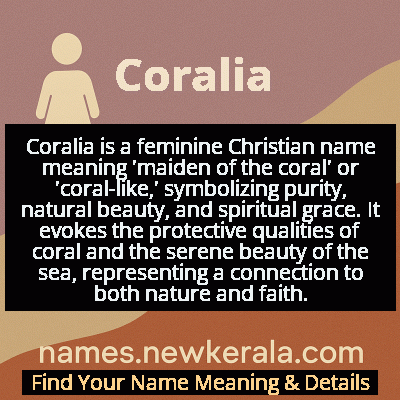Coralia Name Meaning & Details
Origin, Popularity, Numerology Analysis & Name Meaning of Coralia
Discover the origin, meaning, and cultural significance of the name CORALIA. Delve into its historical roots and explore the lasting impact it has had on communities and traditions.
Name
Coralia
Gender
Female
Origin
Christian
Lucky Number
5
Meaning of the Name - Coralia
Coralia is a feminine Christian name meaning 'maiden of the coral' or 'coral-like,' symbolizing purity, natural beauty, and spiritual grace. It evokes the protective qualities of coral and the serene beauty of the sea, representing a connection to both nature and faith.
Coralia - Complete Numerology Analysis
Your Numerology Number
Based on Pythagorean Numerology System
Ruling Planet
Mercury
Positive Nature
Adventurous, dynamic, curious, and social.
Negative Traits
Restless, impatient, inconsistent, prone to indulgence.
Lucky Colours
Green, white.
Lucky Days
Wednesday.
Lucky Stones
Emerald.
Harmony Numbers
1, 3, 9.
Best Suited Professions
Sales, marketing, travel, entertainment.
What People Like About You
Versatility, charisma, adventurous spirit.
Famous People Named Coralia
Coralia López
Actress
Renowned Spanish theater and television actress known for classical roles
Coralia Cartis
Mathematician
Romanian mathematician known for contributions to functional analysis and operator theory
Coralia de la Peña
Religious Figure
Spanish nun recognized for charitable works and establishing orphanages
Name Variations & International Equivalents
Click on blue names to explore their detailed meanings. Gray names with will be available soon.
Cultural & Historical Significance
In Christian naming traditions, Coralia gained significance through its association with coral's protective qualities, which were metaphorically linked to spiritual protection and divine grace. Many early Christian communities in coastal regions adopted the name for daughters born near the sea, seeing it as a blessing from both God and nature. The name's usage spread through Mediterranean trade routes, becoming established in Catholic and Orthodox communities where coral religious artifacts were common. This dual heritage of natural wonder and spiritual symbolism has kept Coralia relevant across centuries, adapting to different cultural contexts while maintaining its core associations with beauty, protection, and faith.
Extended Personality Analysis
Women named Coralia are often perceived as graceful, intuitive, and deeply connected to nature and beauty. They typically exhibit strong emotional intelligence and empathy, making them excellent listeners and compassionate friends. Their connection to the sea through the name's meaning often translates to a love for creativity, art, and fluid self-expression. Coralias tend to be adaptable yet principled, able to navigate changing circumstances while maintaining their core values. They often possess a quiet strength and resilience, much like coral reefs that withstand ocean currents. Many demonstrate artistic talents or strong appreciation for aesthetics, with particular affinity for music, dance, or visual arts.
In social settings, Coralias are often the calming presence in groups, using their natural diplomacy to resolve conflicts and bring people together. They value deep, meaningful relationships over superficial connections and are known for their loyalty to friends and family. While they may appear reserved initially, they reveal warm, engaging personalities to those they trust. Their intuitive nature makes them excellent at reading situations and people, often anticipating needs before they're expressed. Professionally, they excel in creative fields, education, healthcare, or environmental work where they can express their nurturing qualities and make meaningful contributions. Despite their gentle demeanor, they possess inner strength that allows them to overcome challenges with grace and determination.
Modern Usage & Popularity
In contemporary naming practices, Coralia maintains a niche but respected position, appealing to parents seeking names that are both distinctive and meaningful. Its usage has remained relatively stable over recent decades, with slight increases during periods when nature-inspired names trend upward. The name is particularly popular among families with Mediterranean heritage, where it preserves cultural connections while feeling fresh and modern. In the United States, it remains outside the top 1000 names but sees consistent usage, especially in coastal states and culturally diverse urban areas. The growing interest in unique names and environmental awareness has brought renewed attention to Coralia, with parents appreciating its ecological connections and melodic sound. It's often chosen by families who value both tradition and individuality, serving as a bridge between classical naming conventions and modern sensibilities.
Symbolic & Spiritual Meanings
Symbolically, Coralia represents the intersection of natural beauty and spiritual protection. The coral association connects it to the sea's mysteries, symbolizing depth, intuition, and emotional fluidity. In Christian symbolism, it represents the purity and resilience of faith, much like coral that grows strong despite ocean pressures. The name carries connotations of organic growth, community (like coral colonies), and the beauty that emerges from challenging environments. It symbolizes the balance between strength and delicacy, as coral appears fragile but can form massive, enduring structures. Metaphorically, it suggests a person who can create beauty and stability in their surroundings while maintaining grace under pressure, embodying both the gentle flow of water and the steadfast nature of stone. The name also represents interconnectedness and ecosystem thinking, reflecting how individual beauty contributes to collective strength and harmony.

